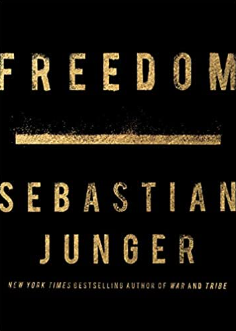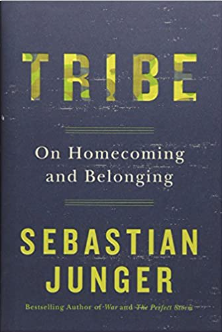Throughout history, humans have been driven by the quest for two cherished ideals: community and freedom. The two don’t coexist easily. We value individuality and self-reliance, yet are utterly dependent on community for our most basic needs. In this intricately crafted and thought-provoking book, Sebastian Junger examines the tension that lies at the heart of what it means to be human.
For much of a year, Junger and three friends—a conflict photographer and two Afghan War vets—walked the railroad lines of the East Coast. It was an experiment in personal autonomy, but also in interdependence. Dodging railroad cops, sleeping under bridges, cooking over fires, and drinking from creeks and rivers, the four men forged a unique reliance on one another.
In Freedom, Junger weaves his account of this journey together with primatology and boxing strategy, the history of labor strikes and Apache raiders, the role of women in resistance movements, and the brutal reality of life on the Pennsylvania frontier. Written in exquisite, razor-sharp prose, the result is a powerful examination of the primary desire that defines us.
Overview
Sebastian Junger tells the story of him and some friends walking along rail lines heavily through Pennsylvania. While walking along these rail lines he intellectually meanders and covers many aspects of Freedom.
Related Books
Tribe
This is his central book and absolutely worth reading.
We have a strong instinct to belong to small groups defined by clear purpose and understanding--"tribes." This tribal connection has been largely lost in modern society, but regaining it may be the key to our psychological survival.
Decades before the American Revolution, Benjamin Franklin lamented that English settlers were constantly fleeing over to the Indians-but Indians almost never did the same. Tribal society has been exerting an almost gravitational pull on Westerners for hundreds of years, and the reason lies deep in our evolutionary past as a communal species. The most recent example of that attraction is combat veterans who come home to find themselves missing the incredibly intimate bonds of platoon life. The loss of closeness that comes at the end of deployment may explain the high rates of post-traumatic stress disorder suffered by military veterans today.
Combining history, psychology, and anthropology, Tribe explores what we can learn from tribal societies about loyalty, belonging, and the eternal human quest for meaning. It explains the irony that-for many veterans as well as civilians-war feels better than peace, adversity can turn out to be a blessing, and disasters are sometimes remembered more fondly than weddings or tropical vacations. Tribe explains why we are stronger when we come together, and how that can be achieved even in today's divided world.
Videos
Freedom
Here is a person who red the whole book. Reading is ok, but it is a free version of the book.
Interview with Junger About Freedom
This is an interview that is from the Spartan Up perspective on the book. It is a little over 30 minutes long and a good summary of the book.
Tribe: Junger on his Book
Tribe is probably Junger's "big idea" book. It is the book that brilliantly lays out his big idea and the relationship between the warrior and society. It is absolutely a book worth reading.
Podcast
Honestly
Bari Weis, as always, did a great job interviewing Junger on the podcast that covers a wide ranging set of subjects not just limited to Freedom.
Potential Discussion Questions
I loved Tribe. I thought it was a brilliant book. I found the book Freedom to be a long footnote of Tribe. With that said, I think this book is a great book to generate discussion around the concept of freedom. Here are a few thoughts that came up while reading the book.
- Is there a feminine and masculine view on the definition of freedom?
- Is there tension between freedom and community obligations?
- How does the definition or role of freedom change with your definition of community?
- How does our society handle this tension?
- Does our definition of freedom change as we age? If yes, why? Is it at any point "correct"?
- What does it mean to be free?
- How do we achieve freedom?
- Is freedom achievable?
- Is freedom important and what is its relationship to other important values?
Discussion Summary
On 7 May 2023 we had an excellent discussion about the book and subject of Freedom. We consisted of Randy, Julie, David, Mary Ann, Chet, Amy, Sam and a new friend Tori. Julie introduced Tori to the group. The discussion took place via Zoom and lasted about an hour. The discussion was lively and thoughtful.
In chatting about the book we realized that the ladies and Sam had read or listened to the book and the others had not yet gotten to it. Sam led off with a question to the ladies as to whether they thought Junger provided a masculine take on Freedom and what their take was. Nearly to a person they expressed safety concerns at the idea of walking along the train tracks and that this was a form of freedom that would not cross their minds. This led to a very interesting discussion about what it meant to be free and what freedom meant to different people.
Realizing that Junger had a very political-cultural approach to freedom the group discussed that aspect for quite a bit. The group talked about the tension between individual freedom and community responsibility. It was particularly interesting to hear Amy's perspective of imposing the desire of the community via law on the individual.
Sam meandered off for a little bit on the theological aspect of freedom, but quickly came back to the political-cultural aspect.
Overall it was a good discussion with many different perspectives. When discussing the next book to read Tori recommended The Killers of the Flower Moon and the group concurred so that will be our next book.



